Looking for dairy alternatives? Perhaps you've decided to go vegan, have developed a Lactose intolerance, or just want to discover the many health benefits a dairy-free diet can bring.
Whatever your incentive, you're in good hands. We here at Expert Home Tips are well-versed in the art of eating dairy-free, with some of us adopting a low-dairy lifestyle and others having taken part in Veganuary.
Today we're sharing an essential list of dairy alternatives everyone going dairy-free should have on hand.
Ready to go dairy-free, without compromising on taste or time? Check out the list below!
3 reasons to go dairy free
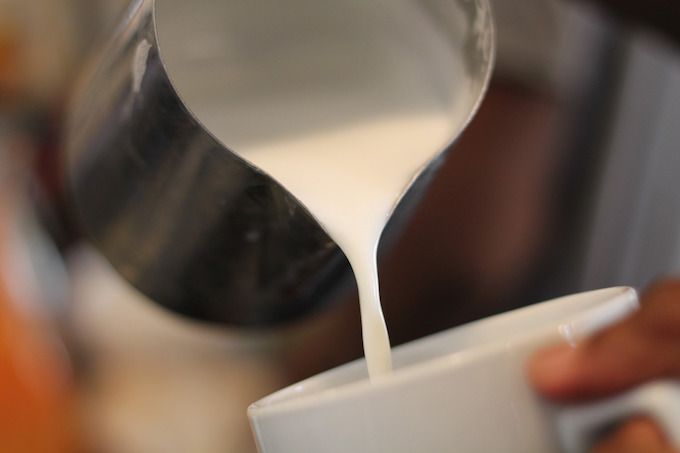
1. Veganism
One of the reasons to go dairy free is becoming a vegan. Vegans eat a diet that is entirely free from animal products. As all dairy is made from milk, it's off the menu if you're vegan.
People choose to go vegan for many reasons. For many, it's the treatment of animals that motivates them. For others, it's the devastating impacts the meat industry has on the environment. Perhaps for you, it's a mixture of the two.
When you choose to go vegan, dairy substitutes will be a Godsend when it comes to curbing your cravings.
2. Lactose intolerance
Having or developing a lactose intolerance is another of the reasons to go dairy free. A lactose intolerance can be developed at any age - often, it's something many people have as a child, but don't discover until they're adults.
People with a lactose intolerance aren't able to digest lactose - a type of sugar found in milk and dairy products.
For those with an intolerance, eating lactose can cause many issues, including bloating, nausea, stomach cramps and diarrhoea.
The best way to avoid these symptoms and be free from pain and discomfort is to adopt a dairy-free diet. Luckily, dairy alternatives make this much easier (and more bearable).
3. Health benefits
Despite dairy having been a part of our diets for decades now, there is still much debate as to whether or not we should actually be eating or drinking it at all.
It's important to remind ourselves of milk's original purpose - to nourish calves. The nutrients it contains is designed not only for an animal, but a young, growing animal. It contains many hormones that are not meant for humans at all.
Many people experience a wealth of health benefits when then ditch dairy, including more energy, less bloating and even clearer skin.
Dairy alternatives - Top substitutes for 8 common dairy staples
1. Dairy-free margarine/butter
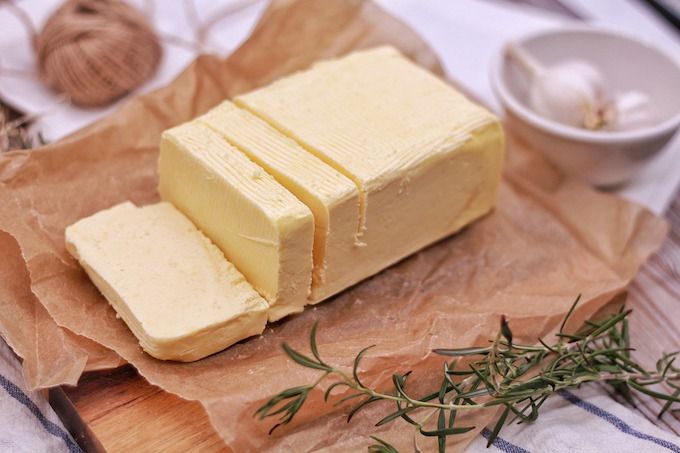
Butter is something that many of us use every day. On toast, sandwiches and steamed veg - it adds a little something special to otherwise dry meals.
Butter has lubricating properties and omitting this quality from meals completely may leave you feeling unsatisfied - after all, what's bread without a bit of butter?!
Thankfully, there are lots of dairy-free susbtitutes on the market nowadays. Dairy-free spreads are readily available at most supermarkets, and you will find an even greater choice at health-food stores.
Dairy-free butters are often plant-based, incorporating things like avocado oil, sunflower oil, and even soy into the mixture to create a creamy consistency. Most of these are also spreadable, making them more practical than traditional butter.
If you're feeling adventurous, or you like to know exactly what's in your food, you may choose to make your own dairy-free butter from scratch. Head over to Unconventional Baker for a list of some of the best, homemade vegan butter recipes out there.
2. Milk alternatives
If you're worried about forgoing the milk in your obligatory morning latté, don't be. There are many dairy alternatives to milk nowadays. Not only do supermarkets stock a large array of dairy-free milk, but even cafés have caught on, and offer a variety of milk alternatives on the menu.
Intrigued? Here are 5 of the most common milk alternatives you could try.
1. Soy milk
Soy milk is perhaps the most readily available dairy-free milk. There are not only many brands (such as Alpro), who offer soya milk, but supermarkets often have their own soya milk too, (which is also often much cheaper). In fact, soya milk is the cheapest dairy-free milk you will find.
At often less than £1 per carton, it offers a creamy, rich taste, that's also high in protein - a definite bonus, especially for vegans, as dairy-free milks are notoriously low in the stuff.
There are some concerns with soy milk, however. It contains estrogen-like compounds that doctors worry could lead to an increased cancer risk. It also increases phlegm production, which can be uncomfortable and irritating.
2. Almond Milk
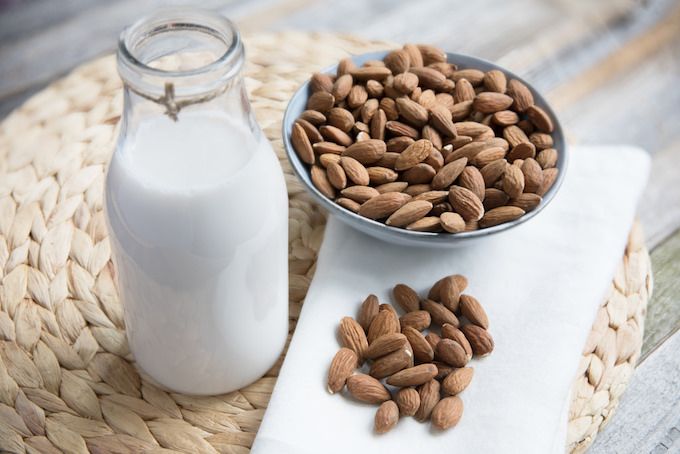
Almond milk is an extremely popular choice when it comes to going dairy-free. It's lower in calories than soy milk, but also has significantly less protein. In fact, most 'almond milk' contains little actual almond at all.
Almond milk is popular as it offers a low-calorie, neutral tasting solution to traditional dairy milk - ideal for everything from tea to cereal.
If you want a richer-tasting, less artificial almond milk, we recommend the brand, Rude Health, which contains just three, all-natural ingredients, and is surprisingly thick and creamy - perfect in your morning coffee.
Next, find out if you can freeze almond milk in our other article.
3. Coconut milk
Coconut milk is another milk alternative you may want to consider. Unlike soya and almond milk, it has a more distinct taste, which you'll either love or hate.
It's nice in cereals and hot chocolate, but can add a strange taste to coffee and tea. It also contains no protein to speak of, and is pretty high in saturated fat.
4. Oat milk
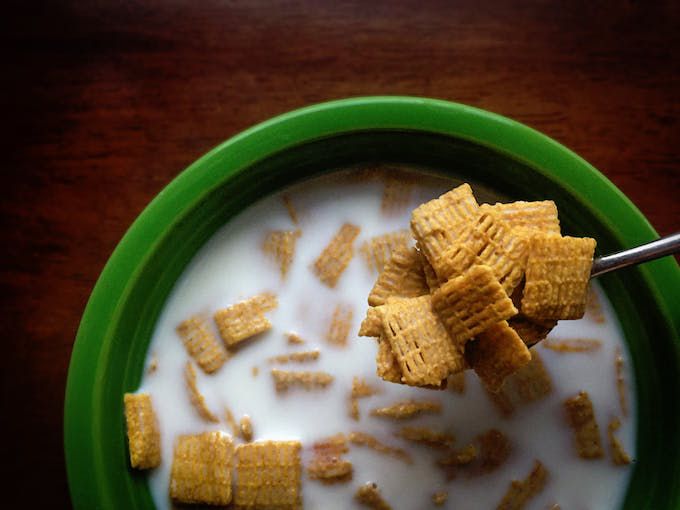
Oat milk is the dairy-free choice of the coffee connoisseur! It's the creamiest of all the milk alternatives, and cracking in a latte, cappuccino or hot chocolate.
It's higher in calories than almond milk, but contains impressive amounts of calcium, Vitamin A and iron too (an important factor if you're also going meat-free). Whilst it can't champion soya milk for protein, it does contain more than other dairy-free milk.
The downside of oat milk? It's still relatively new on the market, so much more experience than your average supermarket soya milk.
5. Rice milk
Another popular choice is rice milk. Unlike the other milk alternatives, rice milk is naturally sweet, so is a popular choice for cereal, sweet drinks and dairy-free desserts too.
Similarly to almond and coconut milk, however, it contains no protein. It's also high in carbohydrates - something to consider if you're diabetic.
Conclusion: soya milk is always a good one to try, but it's a personal choice. See how your body reacts to it, and go from there. Almond milk is especially good if you're trying to watch the calories, and looking for a neutral-tasting option. Oat milk is by far the best taste-wise, and arguably the 'milkiest' of all the milk alternatives on offer.
Why not keep a few on hand and alternate them? You could have soya or oat in coffee and almond in cereal (or rice, if you fancy something sweet).
3. Cheese alternatives
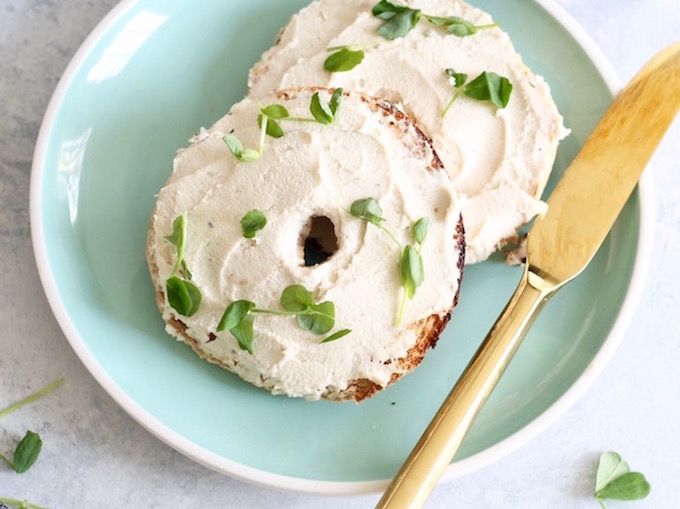
Cheese - it's a big one. For many people, cutting milk is easy - it's the cheese boards, pizzas, and toasties that are the hard part.
Over the last few years, even dairy-free cheese products have started popping up in supermarkets - some of which are surprisingly tasty, and authentic! If you're looking for something that melts like the real day, dairy-free cheese products could be worth trying.
However, there are other things that can help recreate that cheesiness you crave too. Yeast flakes are a common ingredient in most dairy-free households - you can sprinkle them over fajitas, pasta and other dishes to give a cheese-like taste. They're relatively cheap, and also nutritious.
Another substitute can be made from cashews - yes, really! Cashew cream 'cheese' is a phenomenon that makes a great dairy alternative for cream cheese - ideal for spreading on crackers and bagels.
Want to give it a go? Try this 4-ingredient recipe from Hummusapien.
4. Dairy-free yoghurt alternatives
Worried you won't be able to live without the yoghurt and berry breakfast you so love? Don't fret - there are many dairy alternatives of the yoghurt variety too.
For sweet stuff, try soya, almond or coconut yoghurt. Most of these are sweetened, so you may even be able to emit your drizzle of honey.
Similarly to milk alternatives, soya yoghurts are the most popular, and come in a variety of flavours. You can treat yourself to a peach, strawberry and even chocolate or caramel dairy-free yoghurt if you fancy something naughty!
If it's something more neutral you're after - for drizzling into curries or serving alongside flatbread - soya is also your best choice. You can get an unsweetened version, and blend with some fresh herbs, salt, pepper and a little lemon to give it a savoury zing.
5. Dairy-free chocolate alternatives
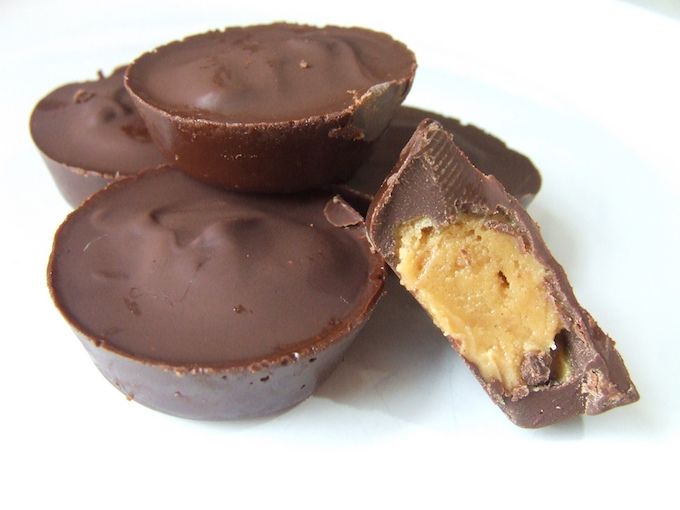
Milkyway; Daim; Dairy Milk; Galaxy - pure, sumptuous deliciousness (that's also laden with dairy).
The creaminess of your favourite chocolate bar comes from - you guessed it - milk, so it's another thing you need to omit if you're adopting a dairy-free diet.
Of course, there's the obvious solution - dark chocolate. Some dark chocolate is truly delicious, and if you try enough different brands and flavours, you're sure to find a satisfying dairy-free chocolate alternative.
TOP TIP: Just be sure to check the ingredient list on whatever you're buying, as sometimes milk is sneaked in despite the 'dark' label).
If dark chocolate isn't quite cutting it for you - and who can really blame you after a life full of milk chocolate? - there are other options. Both supermarkets and health stores now stock an impressive selection of dairy-free chocolate alternatives. With everything from chocolate lollipops to chocolate-covered raisins available dairy-free, there's no reason to ever feel like you're missing out.
Want a quick fix, fast? You can make your own dairy-free chocolate at home using coconut oil, cocoa powder and liquid sweetener. It's easy, healthy, delicious, and dairy-free! Head to Allrecipes for a customisable recipe.
6. Cream alternatives
The sad truth of it is, if you cut out dairy, you'll find you have much less reason to eat cream. With most traditional desserts off the menu, cream becomes pretty redundant.
For pouring over things like fruit, or dairy-free desserts, however, you have options. Soya is again the champion here - you can pick up soya cream from your local supermarket in a small carton alongside the traditional single and double creams.
For something slightly healthier and all-natural, cashews reign supreme. Soak cashews in water overnight, and blend them on high with a little water the next day. Keep adding water until you reach the desired consistency, and the result will be a rich and creamy topping for vegan brownies and cakes.
TOP TIP: Why not add some vanilla pod seeds to your cashew cream to make it even more luxurious?
7. Dairy alternatives to sour cream
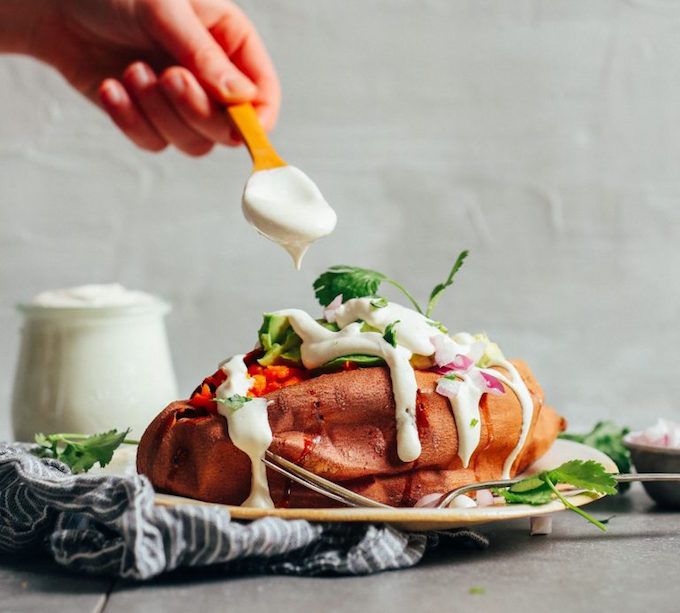
Of all the dairy foods, sour cream is the trickiest to substitute. Made from fermenting regular cream, it's difficult to substitute.
Thankfully, the supermarkets have been quick to act when it coming up with dairy alternatives. Tesco offer a dairy-free 'Creamy Sour Topping'. Green Valley also do a lactose-free version, so if you're just catering to a lactose intolerance, this could be your best shot.
Finally, the vegan bloggers have again done us proud by providing many homemade solutions to this delicious topping. Minimalist Baker's dairy-free sour cream is sensationally simple and uses ingredients we've already mentioned, including cashews.
8. Dairy-free ice cream
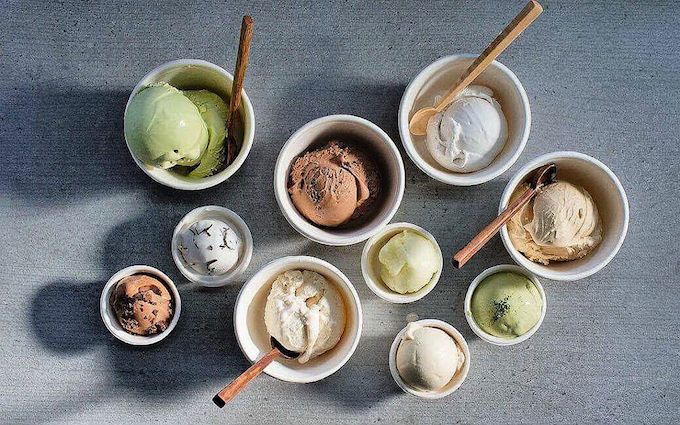
Last but certainly not least of our list is dairy-free ice cream. Let's face it, it's definitely an essential food for most of us. After a stressful day of work, on a hot Summer's day, or just something to bribe the kids with, ice cream is always handy to have on hand.
The problem? The key's in the name: ice cream. Now, we could advocate that you switch to sorbets - both dairy-free and lower in calories than ice cream - but we're not that cruel.
You may have heard of banana 'nice cream'. This was one of the first dairy alternatives invented for ice cream - made by blending frozen bananas. Whilst it's creamy and undeniably cold, it's understandably banana-y and no match for the real deal.
But 'nice cream' has developed since then. Dairy-free ice creams have come a long way and there are now many different brands offering many different dairy -free alternatives. From Booja Booja's Hunky Punky Chocolate - which is extremely rich and 100% natural, to Ben & Jerry's naughtier, Peanut Butter & Cookies dairy-free tub, the options are literally endless.
Going dairy-free at dessert time really has never been easier.
Who knew there were so many dairy alternatives out there? Do you have any favourites? Let us know in the comments below.
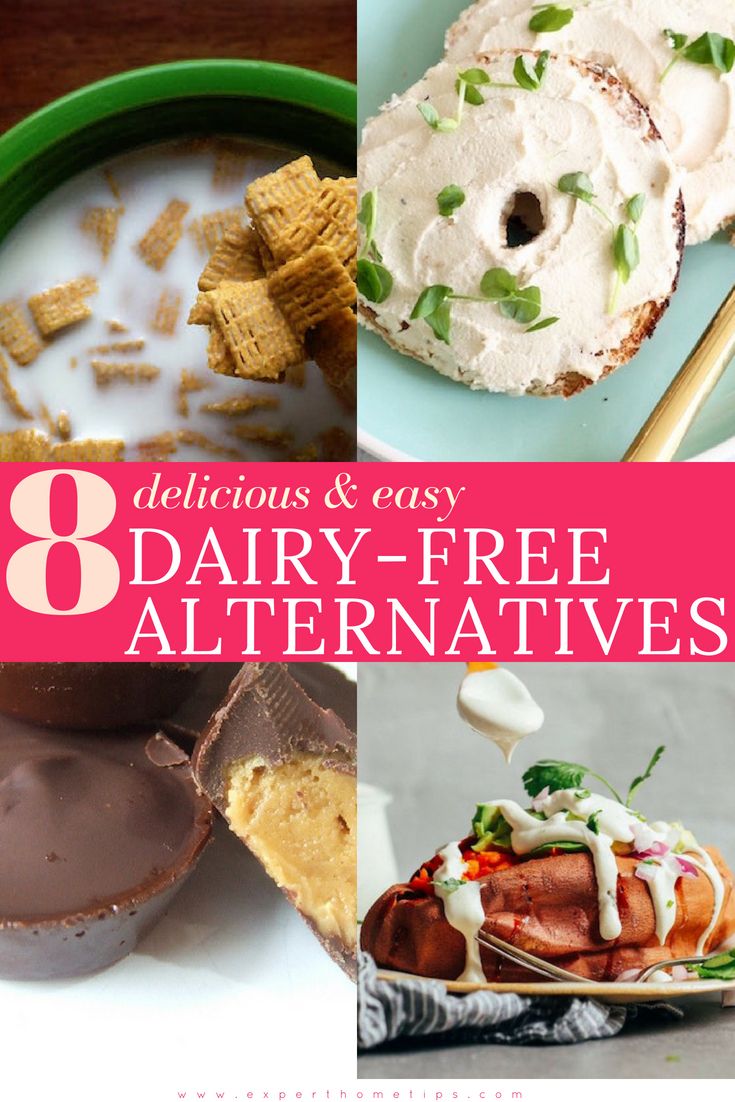
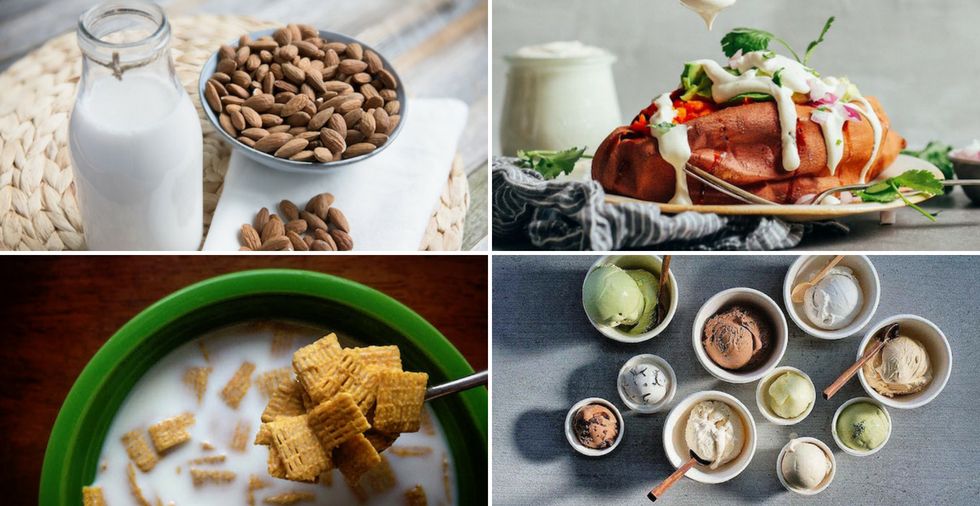
Leave a Reply